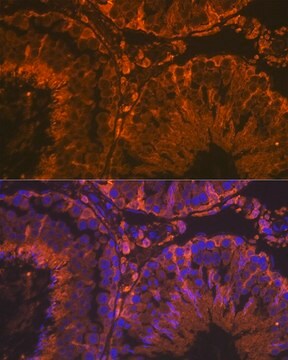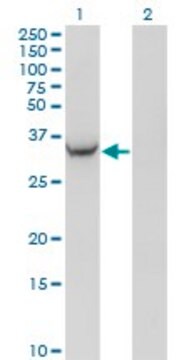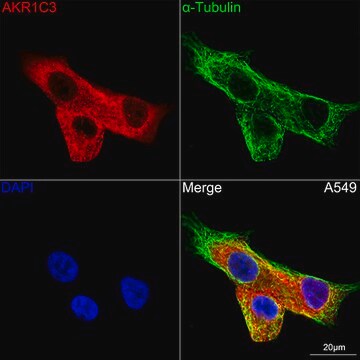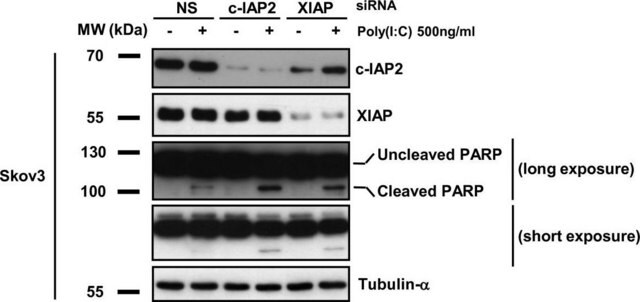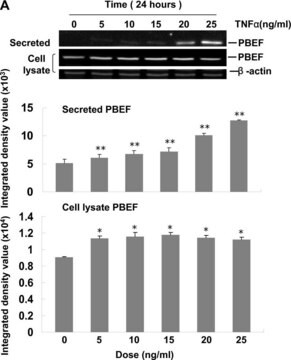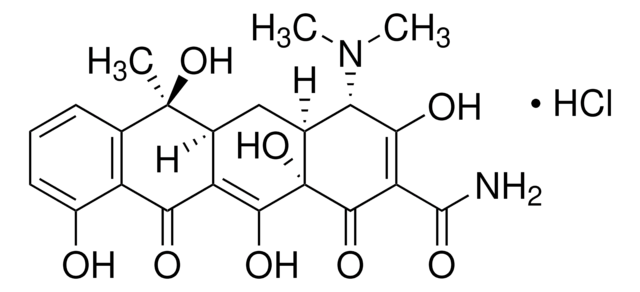추천 제품
생물학적 소스
mouse
Quality Level
결합
unconjugated
항체 형태
purified immunoglobulin
항체 생산 유형
primary antibodies
클론
NP6.G6.A6, monoclonal
양식
buffered aqueous solution
분자량
antigen ~38 kDa
종 반응성
human
포장
antibody small pack of 25 μL
기술
immunohistochemistry: suitable
indirect ELISA: suitable
microarray: suitable
western blot: 0.25-0.5 μg/mL using cytosolic fraction extract of A549 human lung carcinoma cell
동형
IgG1
UniProt 수납 번호
배송 상태
dry ice
저장 온도
−20°C
타겟 번역 후 변형
unmodified
유전자 정보
human ... AKR1C3(8644)
일반 설명
Anti-AKR1C3 antibody, Mouse monoclonal (humanα - hydroxysteroid dehydrogenase, type 2,3; 17β- hydroxysteroid dehydrogenase, type 5) (mouse IgG1 isotype) is derived from the hybridoma NP6.G6. A6 produced by the fusion of mouse myeloma cells (SP20 cells) and splenocytes from BALB/c mice immunized with human AKR1C3 protein. Oxidoreduction of natural and foreign substrates is performed by three enzymes superfamilies, one of them being the AKRs (aldo-keto reductases) family. This family contains 114 proteins that are expressed in prokaryotes and eukaryotes and is divided into 14 subfamilies (AKR1-AKR14). The AKR1 family is the largest among the different fourteen families and contains the aldose reductases, aldehyde reductases, hydroxysteroid dehydrogenases, and steroid 5 β-reductases. AKR1Cs are expressed in many tissues.
면역원
human AKR1C3 protein.
애플리케이션
Anti-AKR1C3 antibody, Mouse monoclonal has been used in
- western blotting
- immunohistochemistry
- enzyme linked immunoassay (ELISA).
Applications in which this antibody has been used successfully, and the associated peer-reviewed papers, are given below.
Immunohistochemistry (1 paper)
Immunohistochemistry (1 paper)
Immunohistochemistry on human placentas were performed using monoclonal mouse anti-AKR1C3 at a dilution of 1:100 or western blot at 1:500.
Mouse monoclonal clone NP6.G6.A6 anti-AKR1C3 antibody used to tag aldo-keto reductase 1C3 for detection and quantitation by immunocytochemical and immunohistochemical (IHC) techniques. It is used as a probe to determine the presence and roles of aldo-keto reductase 1C3 in the regulation of the androgen 5α-dihydrotestosterone (DHT) and 3α-diol compound levels in vivo.
생화학적/생리학적 작용
In humans AKR1C3 (aldo-keto reductase family 1 member C3) including AKR1C1,2 and 4, catalyze the reduction of the androgen 5α-dihydrotestosterone (DHT) into inactive 3β or 3α-androstane diol (3α/β-Diol). AKR1C1-4 isoforms also display 3α[17β]-hydroxysteroid oxidase activity using 3α-Diol as a substrate, in vitro. In non-small cell lung carcinoma, AKR1Cs expression is dramatically increased. Due to their product profile and discrete tissue localization, they may regulate the level of active androgens, estrogens, and progestins in target tissues.
표적 설명
AKR1C3, aldo-keto reductase family 1, member C3 (3-α hydroxysteroid dehydrogenase, type II), encodes a member of the aldo/keto reductase superfamily, which consists of more than 40 known enzymes and proteins. These enzymes catalyze the conversion of
물리적 형태
Solution in 0.01 M phosphate buffered saline, pH 7.4, containing 15 mM sodium azide.
면책조항
Unless otherwise stated in our catalog or other company documentation accompanying the product(s), our products are intended for research use only and are not to be used for any other purpose, which includes but is not limited to, unauthorized commercial uses, in vitro diagnostic uses, ex vivo or in vivo therapeutic uses or any type of consumption or application to humans or animals.
적합한 제품을 찾을 수 없으신가요?
당사의 제품 선택기 도구.을(를) 시도해 보세요.
Storage Class Code
12 - Non Combustible Liquids
WGK
WGK 2
Flash Point (°F)
Not applicable
Flash Point (°C)
Not applicable
개인 보호 장비
Eyeshields, Gloves, multi-purpose combination respirator cartridge (US)
Human cytosolic 3alpha-hydroxysteroid dehydrogenases of the aldo-keto reductase superfamily display significant 3beta-hydroxysteroid dehydrogenase activity: implications for steroid hormone metabolism and action
Steckelbroeck S, et al.
The Journal of Biological Chemistry, 279(11), 10784-10795 (2004)
Rob D Catalano et al.
Molecular human reproduction, 17(3), 182-192 (2010-11-30)
Prostanoids are well-described primary mediators of inflammatory processes and are essential for the normal physiological function of the female reproductive system. The aim of this study was to determine the temporal expression of the prostanoid biosynthetic enzymes (PTGS1, PTGS2, PTGES
Human 3alpha-hydroxysteroid dehydrogenase isoforms (AKR1C1-AKR1C4) of the aldo-keto reductase superfamily: functional plasticity and tissue distribution reveals roles in the inactivation and formation of male and female sex hormones
Penning TM, et al.
The Biochemical Journal, 351(27), 1-1 (2000)
The aldo-keto reductase superfamily homepage
Hyndman D, et al.
Chemico-Biological Interactions, 143-144(27), 621-631 (2003)
Julie J Loiselle et al.
Journal of environmental radioactivity, 196, 64-81 (2018-11-06)
Radon is the second leading cause of lung cancer, after tobacco smoke. While tobacco smoke-induced carcinogenesis has been studied extensively, far less is known about radon-induced carcinogenesis, particularly in relation to the influence of radon on gene expression. The objectives
자사의 과학자팀은 생명 과학, 재료 과학, 화학 합성, 크로마토그래피, 분석 및 기타 많은 영역을 포함한 모든 과학 분야에 경험이 있습니다..
고객지원팀으로 연락바랍니다.
